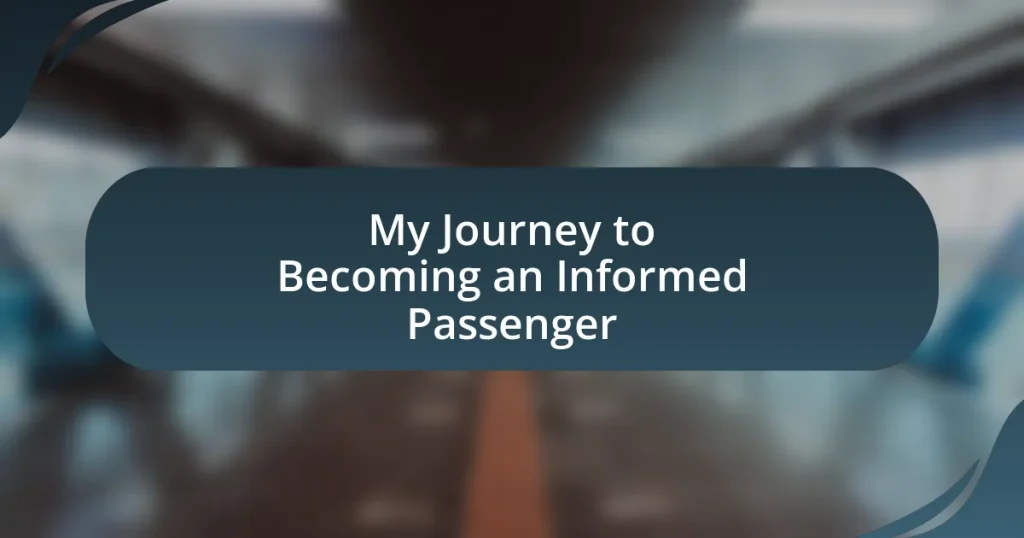Key takeaways:
- Passengers should engage actively in their travel experience by understanding safety protocols and the impact of their behavior on fellow travelers.
- Identifying personal travel needs related to comfort, purpose, budget, and research is crucial for a fulfilling journey.
- Researching airlines, their routes, and safety records enhances travel experiences and alleviates anxiety.
- Being informed about passenger rights empowers travelers to advocate for themselves during disruptions like delays and cancellations.
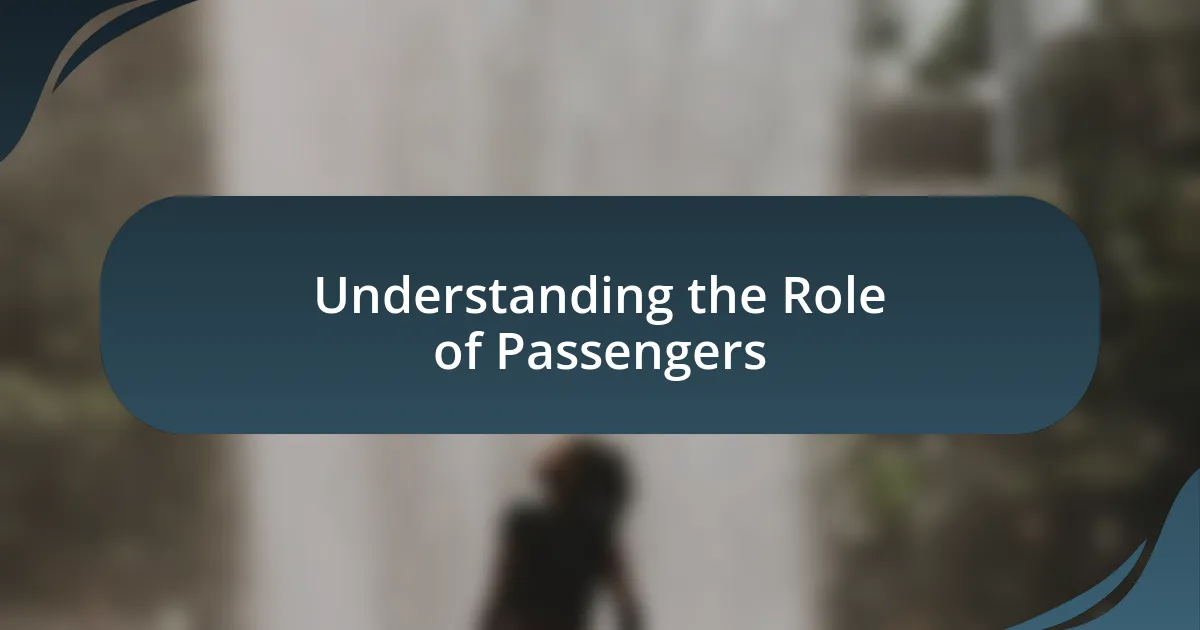
Understanding the Role of Passengers
Passengers play a crucial role in the travel experience, and my understanding of this responsibility has evolved over time. Initially, I thought being a passenger was just about enjoying the ride. However, I soon realized that being engaged in the travel process—understanding the travel norms, the importance of safety protocols, and the impact of my presence on the journey—can significantly enhance my overall experience.
I’ll never forget a time when I boarded a flight and overheard a conversation about the importance of passengers being aware of emergency procedures. It struck me how often we dismiss these safety briefings as mundane. But what if an emergency arose? I started asking myself: how prepared am I to respond in such situations? This mindset shift made me feel more involved and responsible for not just my own safety, but also for those around me.
Moreover, being an informed passenger means embracing respect for crew members and fellow travelers. It’s remarkable how a simple smile or polite conversation can improve the atmosphere onboard. Have you ever considered how your attitude affects those around you? By being courteous and understanding, I found that the journey transforms into a shared experience, filled with camaraderie and cooperation, rather than just a means to an end.

Identifying Your Travel Needs
Identifying your travel needs is an essential first step toward enhancing your experience as a passenger. From my own experiences, I’ve learned that considering factors like comfort, budget, and preferences can truly set the stage for a smoother journey. For instance, on a long-haul flight, I once chose extra legroom seating without realizing how much it would impact my comfort level. It was a game-changer; I arrived at my destination feeling refreshed rather than exhausted.
Additionally, it’s crucial to think about what you really want from your travel experience. Are you looking to unwind, explore new cultures, or simply get from point A to point B? I remember a spontaneous weekend trip where I focused only on the destination but neglected to consider whether I would enjoy the journey itself. This left me feeling unfulfilled. Finding the right balance between the two makes all the difference.
Lastly, don’t underestimate the power of research. Understanding your travel options can empower you to make conscious choices that align with your needs. For example, when planning a recent family vacation, I made it a point to look into family-friendly airlines and accommodations. It was instrumental in ensuring that our journey was enjoyable for everyone, especially for the kids who need a bit more consideration. Ultimately, identifying your travel needs is a personal journey that sets the tone for everything that follows.
| Travel Need | Considerations |
|---|---|
| Comfort | Seat selection, legroom, amenities |
| Purpose | Leisure, business, adventure |
| Budget | Cost of travel, accommodations, dining |
| Research | Understanding options, reading reviews, planning |
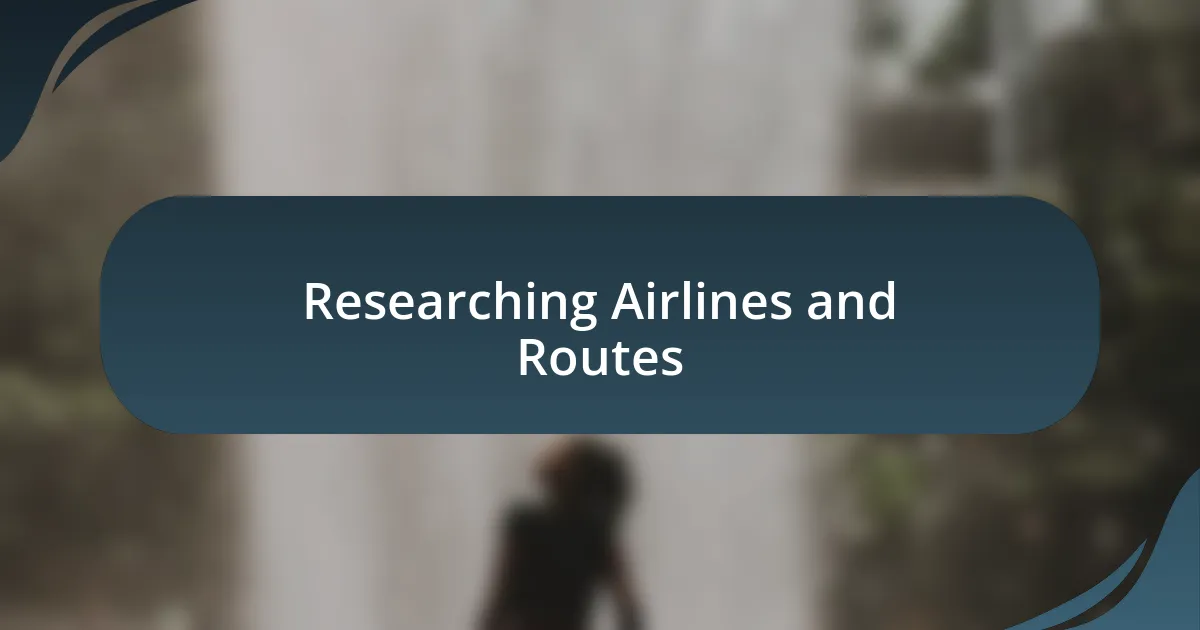
Researching Airlines and Routes
Researching Airlines and Routes
When I delve into researching airlines and routes, it often feels like preparing for a mini-adventure before the actual trip. Recently, while planning a vacation in Europe, I took time to compare different airlines and their routes. I stumbled upon some budget carriers that offered surprisingly convenient schedules. The excitement of discovering direct flights that aligned with my itinerary saved me not just money but also the stress of layovers.
Here are some key considerations when researching airlines and routes:
- Flight Duration: Direct flights often save time, but sometimes layovers can offer unique experiences.
- Airline Reputation: Researching reviews can reveal insights about customer service and overall flight experience.
- Baggage Policies: Understanding each airline’s rules can prevent unwelcome fees at check-in.
- Frequency of Flights: More options on a route mean greater flexibility in case of changes.
- Amenities Offered: Depending on your needs, things like Wi-Fi, in-flight entertainment, and meal quality can significantly impact your journey.
I’ve learned that taking the time to explore my options not only enriches my travel experience but also cultivates excitement for the adventure ahead. For instance, I discovered a local airline that served delicious regional snacks during the flight! Such small details can make the difference between a routine travel experience and something memorable.
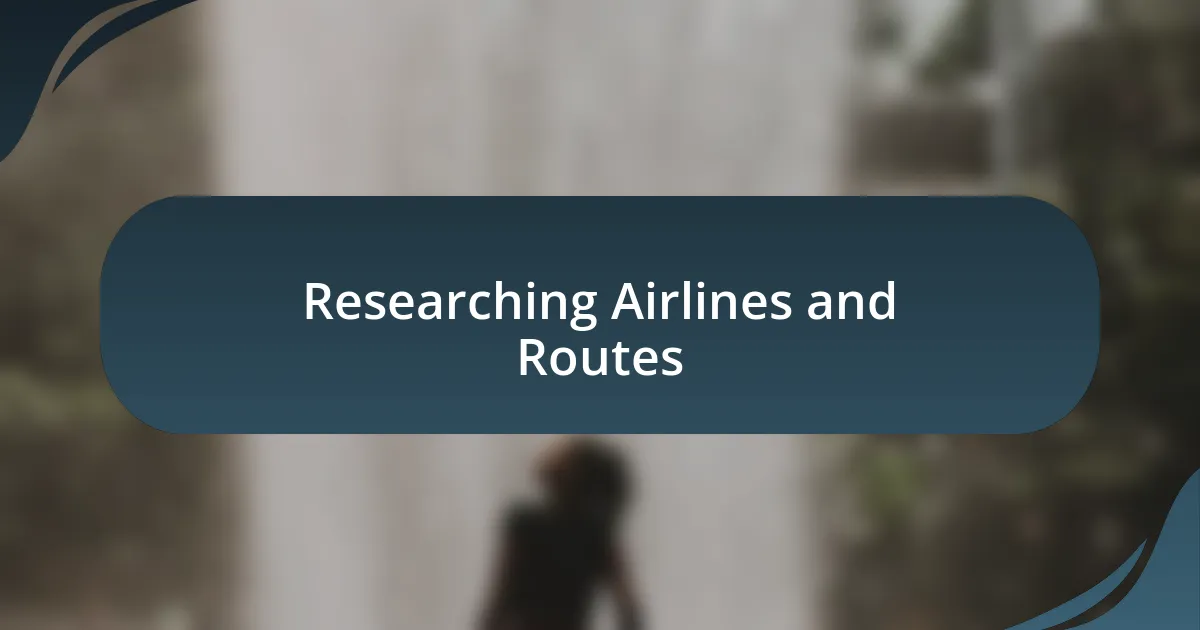
Evaluating Safety and Security Measures
When evaluating safety and security measures, I always start with a closer look at a carrier’s safety record. It’s surprising how much information you can find online about incidents from various airlines. The first time I checked this, I remember my anxiety about flying decreased significantly knowing that I was flying with a company that prioritized safety.
In my experience, security measures at airports also vary widely. I recall standing in a long line, waiting for security in a foreign airport, feeling a mix of impatience and reassurance. The comprehensive screening processes made me appreciate the emphasis on safety that often goes unnoticed during more routine travel. Isn’t it comforting to know that there are systems in place that truly prioritize passenger protection?
Moreover, I find that keeping abreast of the latest travel advisories can make all the difference. There have been times when I’ve changed my plans based on updated guidelines, prioritizing not just my safety but that of those traveling with me. I believe it’s all about being proactive and informed—after all, wouldn’t you rather know beforehand than face potential pitfalls during your journey? Taking a few extra moments to research these measures has become a vital part of my travel prep.

Knowing Your Passenger Rights
Understanding your passenger rights is essential for a smooth travel experience. I vividly recall a situation where my flight was delayed for hours due to unforeseen circumstances. It was frustrating, but I discovered that I was entitled to compensation and assistance. Knowing these rights in advance helped me advocate for myself, rather than just waiting in frustration.
Many passengers remain unaware of their rights when it comes to flight cancellations or overbookings. I remember overhearing a fellow traveler express dismay over getting bumped from a flight, but the airline had a policy in place that could have worked in their favor. Had they known, they could have sought alternative arrangements that would have made their journey less stressful. Isn’t it empowering to know you have a voice?
Moreover, I have learned that being familiar with the legal protections offered by various governing bodies can make a significant difference. For instance, knowing the European Union regulations about passenger rights saved me once during a major travel disruption. It’s not just about traveling; it’s about feeling empowered and equipped to handle unforeseen challenges. Wouldn’t you agree that being informed enhances the overall travel experience?

Practical Tips for Informed Travel
When it comes to informed travel, research can be a game-changer. I remember my last trip to a foreign country, where I spent time learning about local regulations, customs, and transportation options. This preparation not only kept me safe but also enriched my experience, allowing me to explore places I wouldn’t have known about otherwise. Have you ever felt lost in a new city? I certainly have, but knowing where to go and how to get there made all the difference.
Another crucial aspect is to stay updated on any travel advisories or alerts for your destination. I’ve had moments when I reached a new hotel only to find out that there were ongoing protests nearby. Thankfully, I had checked the news beforehand, which allowed me to adjust my plans. It’s like a safety net, giving you peace of mind while traveling. Doesn’t it feel reassuring to know that you’ve taken the necessary steps to stay informed?
Lastly, keeping your documents organized is vital. I learned this lesson the hard way during a trip when I misplaced my boarding pass and spent a frantic hour searching for it. To avoid that chaos, I now use a travel app to store all my important documents in one place, making travel smoother and more enjoyable. Have you ever had a similar panic during travel? Trust me; it’s an experience I won’t forget. Taking these practical steps not only prepares you for unexpected situations but also transforms the way you experience traveling.
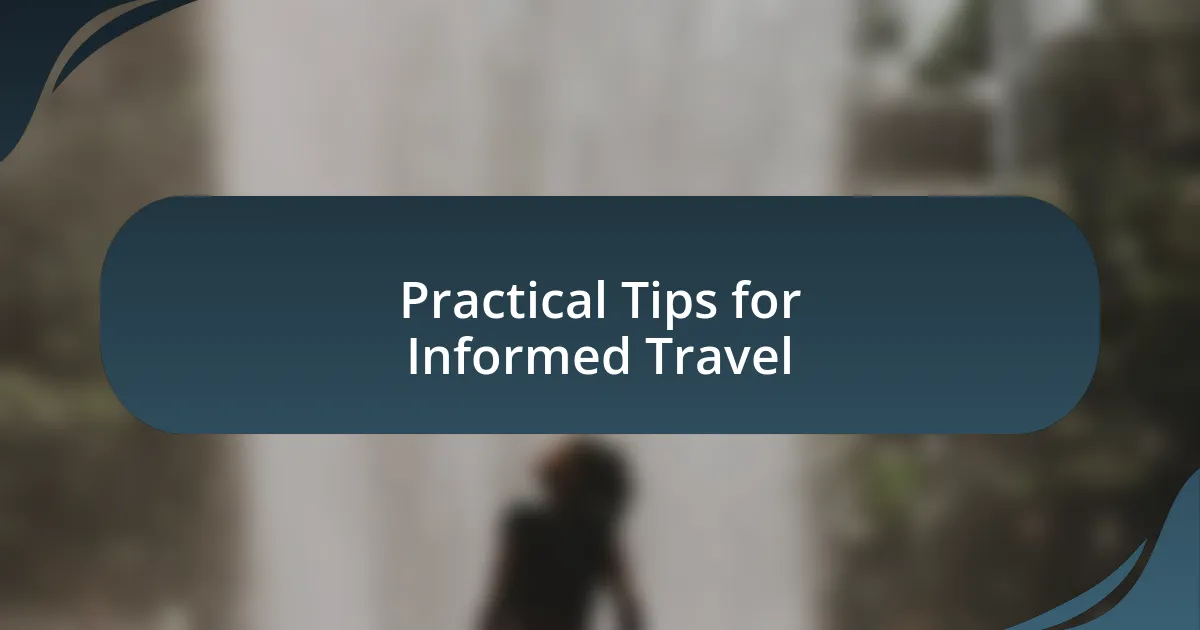
Sharing Your Experiences and Insights
Sharing your experiences can be incredibly valuable for fellow travelers. During my last trip, I started jotting down my thoughts each day, focusing on what surprised me or what I wish I’d known beforehand. It was amazing to realize how these insights helped not only me to clarify my own journey but also provided a roadmap for friends who were planning similar adventures. Have you considered documenting your travels?
One of the most rewarding aspects of sharing experiences is the connections it fosters. After returning home from a solo trip, I joined a travel group online to discuss my discoveries. The back-and-forth conversations unearthed new tips and perspectives that I hadn’t initially thought of. It’s inspiring to see how our collective insights can lead to a richer understanding of the world. Have you ever experienced the power of community feedback?
I’ve discovered that sharing stories often leads to unexpected moments of insight. For instance, after discussing a challenging experience I had with language barriers, someone suggested practical solutions that made future travels much smoother. Engaging with others not only enhances our understanding but also builds a sense of camaraderie among travelers. It’s incredible how one shared story can spark a learning opportunity for both the storyteller and the listener.











